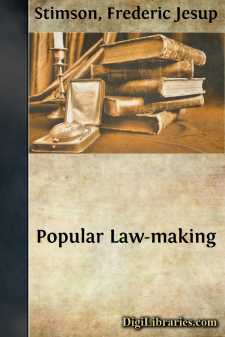Categories
- Antiques & Collectibles 13
- Architecture 36
- Art 48
- Bibles 22
- Biography & Autobiography 813
- Body, Mind & Spirit 142
- Business & Economics 28
- Children's Books 17
- Children's Fiction 14
- Computers 4
- Cooking 94
- Crafts & Hobbies 4
- Drama 346
- Education 46
- Family & Relationships 57
- Fiction 11829
- Games 19
- Gardening 17
- Health & Fitness 34
- History 1377
- House & Home 1
- Humor 147
- Juvenile Fiction 1873
- Juvenile Nonfiction 202
- Language Arts & Disciplines 88
- Law 16
- Literary Collections 686
- Literary Criticism 179
- Mathematics 13
- Medical 41
- Music 40
- Nature 179
- Non-Classifiable 1768
- Performing Arts 7
- Periodicals 1453
- Philosophy 64
- Photography 2
- Poetry 896
- Political Science 203
- Psychology 42
- Reference 154
- Religion 513
- Science 126
- Self-Help 84
- Social Science 81
- Sports & Recreation 34
- Study Aids 3
- Technology & Engineering 59
- Transportation 23
- Travel 463
- True Crime 29
Frederic Jesup Stimson
Frederic Jesup Stimson (1855–1943) was an American lawyer, diplomat, and writer known for his legal scholarship and fiction. He wrote several influential legal texts, including "American Statute Law" and "Labor in Its Relations to Law." Stimson also authored historical novels, such as "King Noanett," which delved into early American history. In addition to his writing career, he served as U.S. Ambassador to Argentina from 1915 to 1921.
Author's Books:
Sort by:
PART ONE: DISCOVERY. It consisted of a few hundred new American eagles and a few times as many Spanish doubloons; for pirates like good broad pieces, fit to skim flat-spun across the waves, or play pitch-and-toss with for men's lives or women's loves; they give five-dollar pieces or thin British guineas to the boy who brings them drink, and silver to their bootblacks, priests, or beggars. It...
more...
I THE ENGLISH IDEA OF LAW My object in the lectures upon which this work is based was to give some notion of the problems of the time (in this country, of course, particularly) which are confronting legislators primarily, political parties in the second place, but finally all good citizens. The treatment was as untechnical as possible. The lectures themselves were for men who meant to go into business,...
more...



